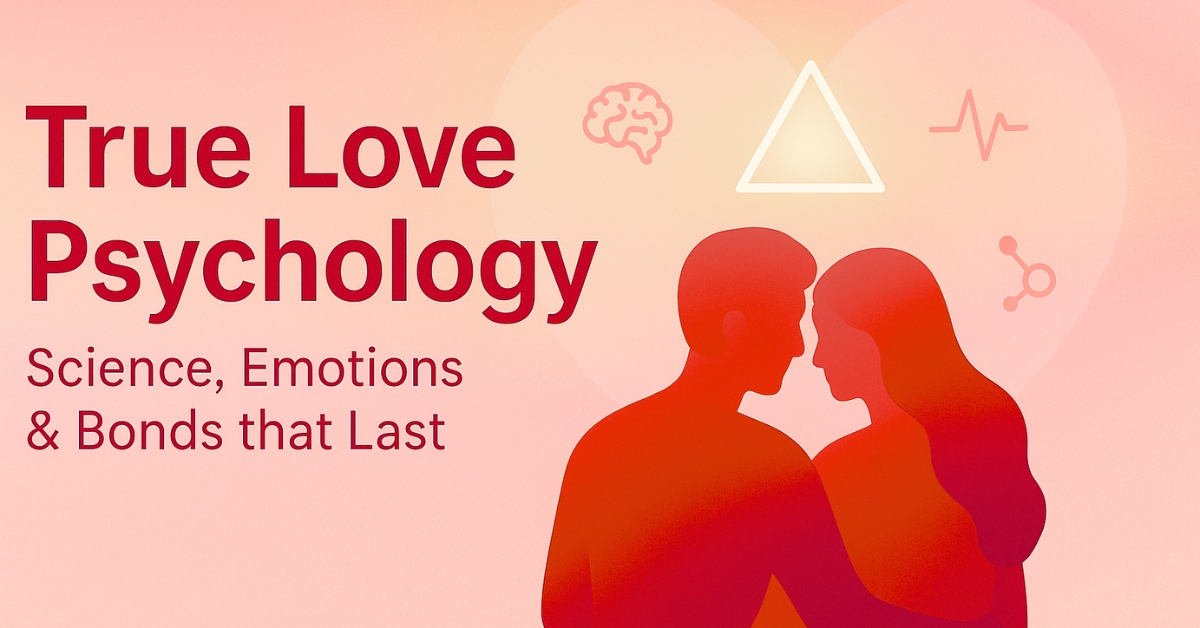True Love Psychology: An In-Depth Guide
Love is one of the most profound human emotions, influencing our lives in ways that go far beyond mere attraction or companionship. Among the various forms of love, true love stands out—it’s deep, lasting, and transformative. But what does true love really mean from a psychological standpoint? How does it set itself apart from infatuation or fleeting passion? And why does our first love leave such a significant mark on our hearts and minds?
In this article, we’ll dive into the psychology of true love—exploring the science, emotions, theories, and real-world effects. From the Sternberg Triangular Theory of Love to the biology of attraction and the influence of attachment styles, you’ll come away with a thorough understanding of how true love develops, changes, and endures over time.
What Is True Love Psychologically?
Psychologists describe true love as a blend of intimacy, passion, and commitment that creates a lasting bond between people. Unlike infatuation or lust, which tend to be fleeting and often rooted in physical attraction, true love runs much deeper.
Here are some key characteristics of true love:
- Emotional intimacy: the capacity to be vulnerable, genuine, and emotionally open.
- Mutual respect and loyalty: appreciating each other’s individuality while building a shared life together.
- Stability and growth: supporting each other’s evolution while staying committed.
- Unconditional acceptance: embracing each other’s flaws without judgment.
This is quite different from romantic obsession or limerence, where the attraction can be intense but is often one-sided and short-lived.
First Love Psychology: Why It Stays With Us Forever
“First love never dies.” It’s a saying we hear often, and there’s a psychological basis for it. Research shows that our first love leaves a lasting emotional mark because it typically occurs during our formative years.
1. Hormonal and Chemical Reactions
When we experience first love, it triggers powerful emotional responses, releasing a mix of dopamine, serotonin, oxytocin, and adrenaline—a recipe for euphoria. This is what gives us those butterflies, the excitement, and the whirlwind of feelings.
2. Memory Bias and Rosy Retrospection
Psychologists note that we tend to romanticize our first love, recalling it with more fondness than it may truly deserve. This creates a nostalgia that can linger for a lifetime.
3. Attachment and Future Relationships
Our first love often lays the groundwork for future relationships. According to attachment theory, the way we connect with others (whether secure, anxious, or avoidant) can shape our romantic interactions down the line.
4. Heartbreak and Emotional Resilience
The heartbreak from our first love can be the most painful because it’s our first real taste of loss. This experience can influence how we cope, build resilience, and set expectations in future relationships.
Psychology of Love: Major Theories
Psychologists have come up with various theories to help us understand love:
Sternberg’s Triangular Theory of Love
Robert Sternberg suggested that love consists of three key elements:
- Intimacy (emotional closeness)
- Passion (physical attraction and desire)
- Commitment (the decision to stay together long-term)
True love is said to exist when all three components are present.
Passionate vs. Companionate Love
- Passionate love is intense, filled with physical and emotional energy (often seen in the early stages of a relationship).
- Companionate love, on the other hand, is deeper and more stable, built on trust and friendship, and develops over time. True love often starts with passion and gradually evolves into a strong companionship.
Let’s dive into the fascinating world of Love and Attachment Theory! This theory sheds light on how the bonds we form in childhood can influence our romantic relationships as adults. Here’s a quick breakdown:
- Secure attachment leads to healthier, more enduring relationships.
- Anxious attachment often brings about a fear of abandonment and a tendency to cling.
- Avoidant attachment can create challenges when it comes to emotional closeness.
Now, let’s explore the Biological & Neuroscientific Basis of Love. Love isn’t just a feeling; it’s also rooted in biology.
- The brain’s reward system kicks in, with dopamine pathways lighting up during moments of love, much like what happens with addictive behaviors.
- Hormones like oxytocin and vasopressin play a crucial role in deepening trust and attachment.
- From an evolutionary perspective, love drives us to form long-lasting bonds, which are essential for survival and reproduction.
Interestingly, neuroscientists have discovered that our first love can actually rewire our brains, creating cognitive and emotional patterns that influence who we’re attracted to later on.
Now, let’s clarify the difference between Limerence and True Love. This is a common mix-up in relationships:
- Limerence is characterized by obsessive infatuation, constant intrusive thoughts, and a deep longing, but it often lacks depth and can be one-sided.
- True love, on the other hand, is grounded in emotional intimacy, mutual respect, and a commitment to grow together.
Psychologists caution that it’s easy to confuse limerence with genuine love, but the former usually fades once the obsession dies down.
So, how can you tell if your love is the real deal? Psychologists highlight these signs of authentic connection:
- Feeling comfortable being vulnerable with each other
- A healthy balance of emotional and physical intimacy
- Shared values and life goals
- A willingness to make sacrifices without holding grudges
- Consistency over time, rather than just fleeting moments of passion
Emotional Intimacy vs Physical Intimacy
Both types of intimacy play a crucial role in our relationships:
- Physical intimacy involves closeness through touch, attraction, and sexuality.
- Emotional intimacy, on the other hand, is about sharing our thoughts, feelings, and fears on a deeper level.
- True love finds a balance between the two—having too much of one without the other can often lead to feelings of dissatisfaction.
What Makes Love Last (Psychologically)?
Researchers have found that lasting love hinges on a few key elements:
- Trust and stability, which are considered the “heart of love.”
- Shared growth, where partners evolve together rather than drift apart.
- Empathy and sacrifice involve giving selflessly without expecting anything in return.
- Positive communication is all about addressing conflicts constructively.
Deep Love vs Infatuation
- Infatuation is typically short-lived, driven by attraction and novelty.
- Deep love, however, is rooted in mutual respect, trust, and long-term emotional intimacy.
- While infatuation can fade quickly, deep love has the power to sustain and grow over time.
Unconditional Love Psychology
Unconditional love is all about giving without expecting anything back. Psychologists regard it as the highest form of love, which requires:
- Selflessness
- Patience
- Acceptance of each other’s flaws
- Support during tough times
This kind of love is often seen in parental relationships but can also flourish in romantic ones.
Psychological Facts About Love
Here are some intriguing insights:
- People with higher self-esteem often enjoy healthier love lives.
- Our love languages—whether it’s through words, acts, gifts, touch, or quality time—shape how we express and receive love.
- Empathy plays a significant role in strengthening romantic connections.
- Love acts as a motivational force, driving us toward deeper connections.
- Moderate sacrifice can help maintain balance in long-term relationships.
FAQs About True Love Psychology
Q1: Is true love just a chemical reaction?
Not entirely. While hormones like dopamine and oxytocin play a role, true love also involves emotional, cognitive, and social factors.
Q2: How do I know if it’s true love or infatuation?
True love grows stronger over time, while infatuation fades. Look for respect, stability, and shared growth.
Q3: Can first love last forever?
For some, yes. But for most, first love serves as an emotional benchmark rather than a lifelong relationship.
Q4: What makes love psychologically healthy?
Secure attachment, trust, vulnerability, and balanced intimacy are key.
Q5: Why does heartbreak hurt so much?
Because love activates the brain’s reward system, breakups feel like withdrawal from an addictive substance.
Final Thoughts
From the nostalgia of first love to the intricate science behind deep emotional bonds, psychology sheds light on why love feels so powerful. True love isn’t just about passion; it encompasses trust, growth, intimacy, and resilience. Whether you’re navigating your first romance or nurturing a long-term marriage, understanding the psychology of true love can empower you to create healthier, more meaningful relationships.
True love, at its core, is not just about finding the right person—it’s about creating the right bond.




